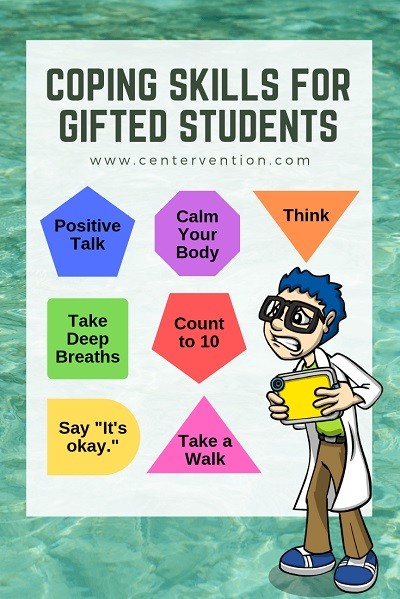
Q: Our gifted child easily breaks down at even the smallest problems. And when he’s stressed out because of worries about a new homework assignment or anticipation about a big soccer tournament, he’s a wreck, even explosive, when he interacts with us or his siblings. How can we help him develop the coping skills he needs to figure out how to handle stressful situations and control his emotions?
All kids encounter situations where they don’t feel confident about to do
Some, with a little work, and improved coping skills, they can overcome these hardships and move on. But for others, especially gifted children, it can cause worry, outbursts, meltdowns and, if allowed to fester, in some cases, anxiety and depression. These children simply haven’t developed the coping skills that are required to manage their emotions as they maneuver through stressful experiences.
The brain development of a gifted child, said Michael Postma, executive director of Supporting Emotional Needs of the Gifted, can make it more difficult for high-achieving kids to find ways to recover from distress. Executive functioning skills, including managing frustration and self-regulation, are generally delayed among gifted populations.
“Our kids need to be implicitly taught executive functioning skills, like prioritization, organization, time management, all those different things that just don’t come naturally,” he said.
What’s more, parents and teachers must help high-achieving kids understand themselves, including how they operate internally and in a world that’s a little bit different from themselves, Postma said.
“With gifted children, they need to understand their emotions, how to control their emotions, how to control their behaviors and how to turn negatives into positives,” Postma said. “We’re not trying to make everything happy happy joy joy, but we have to teach them how to be able to cope because things are going to go wrong.”
Helping them fail
One way to help gifted kids is to encourage them to put some space between the moment they come up against a challenge and then get frustrated or angry, writes Dan Peters, a licensed psychologist and co-founder and clinical director of the Summit Center.
“When this occurs, the child has more time to think and problem-solve before getting upset and shutting down,” says Peters in a piece published on the Davidson Institute’s website. “The more space, the more opportunities for solutions.”
Parents, Peters writes, also should set realistic expectations of their child’s abilities, acknowledging that they can’t be perfect at everything. “Parents and teachers can help a gifted child learn about what he is good at, what he is ‘normal’ at, and what areas are challenges for him,” according to the article.
And, both Peters and Postma agree, providing our gifted children with safe opportunities to fail can give them the life experiences they need to cope with tough times into the future. Teach them, said Postma, that mistakes can often be celebrated.
“You don’t want your kids to fall flat on their face and lose all hope, but you do want them to experience resistance,” he said. “You do want them to fail. And you do want them to learn from what went wrong.”
Experts share more tips on how to help gifted children develop coping skills.
Just listen
“The No.1 thing that parents have to start doing is listening. We like to interfere and give advice right away. We like to fix things. We like to make sure that they’re not being hurt or suffering. Sometimes, the best thing you can do is just listen, empathize and then offer assistance. Sometimes our kids just want to vent. Sometimes they just want to know that somebody is actually listening to them. Be their ally. Listening builds the bond and trust relationship between the parent and child.”
As you listen to your child about their concerns, help them break down the issue and what the possible solutions might be. “Draw it up on the white board, brainstorm, do creative problem solving around the different issues, and look at the positive outcomes.”
Dr. Michael Postma, Executive Director of Supporting Emotional Needs of the Gifted
Give kids a script
When they come up against a tough assignment or hurdle, help kids shift their thinking.
“This doesn’t have to be complicated, just something short she can say to herself to help her manage her emotions. It’s helpful to model these kinds of self-statements. For instance, if your child gives up without trying when a homework assignment appears difficult, you might say to her, ‘Here’s what I want you to say to yourself before starting this: I know this will be hard for me, but I’m going to keep trying. If I get stuck after trying hard, I will ask for help.’ Children with weak emotional control are more prone than peers to dissolve in tears or throw a tantrum when forced to stick with tasks they find frustrating or difficult.”
Peg Dawson, EdD, and Richard Guare, PhD, Smart but Scattered